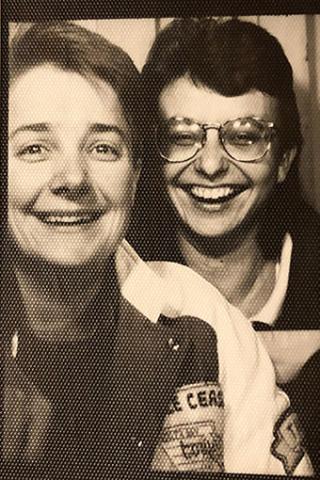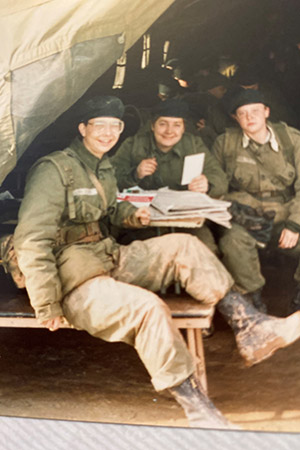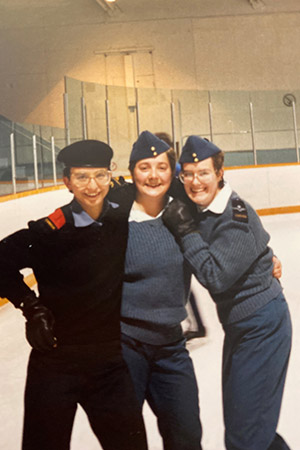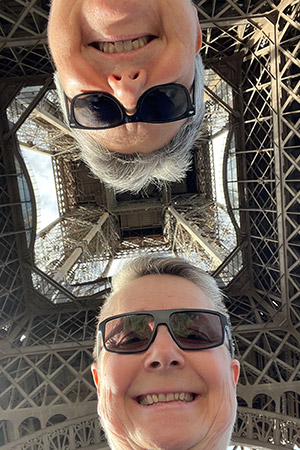
Joined
1988
In November 1988, two young women stood proudly on the parade square at Canadian Forces Base (CFB) Cornwallis, their boots shining in the Autumn sun—their hearts full of optimism and courage.
It was basic training—the intensive transformation where civilians become soldiers.
For new recruits Nicole Crevier and Trudi Fontaine, it also marked the birth of a 37-year friendship that would endure the trials of military life and the injustice of one of the darkest chapters in Canada’s military history—the LGBT Purge.
A meaningful connection

Nicole Crevier (left) and Trudi Fontaine with a comrade at CFB Cornwallis in 1989.
Both women had joined the forces looking for purpose and a sense of belonging.
The minute they met they knew their connection was something special.
They became inseparable.
“We did everything together. It was just soul friends right from the get go,” Fontaine said.
As they navigated military training, including physical and weapons training ——they quickly realized they had to hide an important part of their identities—their sexuality.
They were both gay—at a time when being anything other than straight was a career killer.
From the 1950s to the 1990s, the Canadian government, using surveillance, intimidation and coerced confessions, removed LGBT individuals from positions in the military, RCMP and federal civil service.
Proud soldiers

Nicole Crevier and Trudi Fontaine with a fellow military member ice skating at CFB Cornwallis in the late 1980s.
Fontaine and Crevier were proud soldiers getting rave reviews. Fontaine graduated from Cornwallis in February 1989 as the runner-up for the Commandant’s Shield (Top Recruit) and the Women’s Physical Fitness Award winner. Crevier graduated in the same month and both moved on to CFB Kingston to begin their Performance Oriented Electronics Training (POET).
It was at CFB Kingston, ON when, while playing on the base softball team, they started noticing the Special Investigations Unit (SIU) “K-car” following them around the base and through the city.
They knew the coach of the team was on suspended training because she was gay.
“Because of her, we kind of knew what to expect,” Crevier said.
“At that point our studies started to suffer and our grades started dropping.”
They had also noticed a few fellow recruits vanished from training without notice. Rumours began swirling and they started feeling self-conscious about how they spoke, how they dressed and even who they sat next to in the mess.
“It was like holding your breath underwater,” Fontaine said. “You could do it, but only for so long.”
Coming forward
In an effort to protect their softball teammates from unwanted scrutiny, they hatched a plan.
“At that point it's like, ‘okay, what do you want to do?’” Crevier remembered.
“I said, ‘well, let's come forward.’ You know, we'll see. Kind of see where the chips fall.”
They went to speak to their captain, telling a half-truth—that they were gay and in a romantic relationship.
“We came up with the story that we were together,” Fontaine said.
“We said we met in basic training and we fell in love. Basically we didn't want anybody else implicated. We felt because everybody knew we were together constantly, it just made sense to say, ‘okay, they're together,’” Crevier said.
“We were trying to look out for the rest of the team. So for us to just, I guess, take one for the team, as the saying goes, because you’re in the military, you do that, you look out for each other. We are good soldiers, they would never kick us out, or so we thought.”
It was a calculated risk that cost them their military careers.
“I can still see the look on (the Captain’s) face. Then all of a sudden we are pulled from training,” Crevier said. “I don’t think they knew what to do with us.”
Unwanted scrutiny

Trudi Fontaine (bottom) and Nicole Crevier underneath the Eiffel Tower.
After the disclosure, the military’s Special Investigation Unit (SIU) turned their scrutiny on them, setting up separate interrogations where they were asked invasive questions about their sex lives. They were asked to turn in their gay friends but vowed they never would.
Both of them were sent home before Christmas that year but never told their families why.
All four of their parents died without ever knowing the truth and the shame and humiliation their daughters endured.
Almost 30 years later, in 2017, Crevier stood in the House of Commons as then Prime Minister Justin Trudeau offered an official apology to individuals harmed by federal legislation, policies and practices that led to the oppression of and discrimination against 2SLGBTQI+ people in Canada.
“It is our collective shame that Canadians who identify as lesbian, gay, bisexual, transgender, queer, or two-spirit were unjustly treated—fired from jobs, denied promotions, surveilled, arrested, convicted, and vindictively shamed because of their sexual orientation or gender identity. People lost their livelihoods, their families, and, some, their lives,” Prime Minister Trudeau said.
Crevier said the stories she’s heard since becoming involved in the Rainbow Veterans of Canada advocacy group have made her realize their friendship may have protected them from further harm.
“There were so many others who were assaulted—physically, sexually,” she said. “The only reason I think that did not happen to us is we had each other.”
“Everybody knew not to mess with us. Like, you know, like we were so tight, even then,” Fontaine said.
As the years went on they reminisced about the good times in the military—vacationed together and stood beside each other as they married other women.
Today their affection and history is evident, their stories often merge, they complete each other’s sentences and laugh easily.
An unsevered friendship
Their friendship, unlike their service records, has never been severed. They supported each other through the aftermath of The LGBT Purge—the confusion, the shame and the anger.
Now they are vocal advocates, speaking publicly, not just to tell their own stories, but to amplify the voices of those who suffered in silence.
“It was so unfair. And (the military) lost so many good soldiers,” Crevier said.
They spent the rest of their careers hypervigilant that someone could pull the rug out from under them at any moment. They both said they felt like “frauds” the first few times they participated in Remembrance Day ceremonies as Veterans.
“It’s only now that you realize how much it affected us,” Fontaine said.
But with connection, truth—and a class action lawsuit—their shame has turned to pride.
“We always had each other,” Crevier said.
“That was our saving grace. Although we never spoke about it, we still had each other.
“We made lemonade out of lemons.”
With courage, integrity and loyalty, Nicole Crevier and Trudi Fontaine are leaving their mark. They are Canadian Armed Forces Veterans. Discover more stories.
Veterans impacted by the LGBT Purge or those who want to learn more about advocacy, recognition, and community support, can visit Rainbow Veterans of Canada.
The well-being of Canadian Veterans is at the heart of everything we do. As part of this, we recognize, honour and commemorate the service of all Canadian Veterans. Learn more about the services and benefits that we offer.
If you are a Veteran, family member or caregiver, the support of a mental health professional is available anytime at no cost to you. Call 1-800-268-7708.